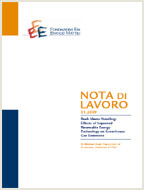The Stability and Effectiveness of Climate Coalitions: A Comparative Analysis of Multiple Integrated Assessment Models

21.01.2014
Kai Lessmann, Ulrike Kornek, Valentina Bosetti, Rob Dellink, Johannes Emmerling, Johan Eyckmans, Miyuki Nagashima, Hans-Peter Weikard, Zili Yang
Q5, Q58, C7
Coalition Stability, International Environmental Agreements, Numerical modeling, Transfers
Climate Change and Sustainable Development
Carlo Carraro
In this paper we report results from a comparison of numerically calibrated game theoretic integrated assessment models that explore stability and performance of international coalitions for climate change mitigation. Specifically, by means of this ensemble of models we are able to identify robust results concerning incentives of nations to commit themselves to a climate agreement, and to estimate what stable agreements can achieve in terms of greenhouse gas mitigation. We also assess the potential of transfers that redistribute the surplus of cooperation in order to foster stability of climate coalitions. In contrast to much of the existing analytical game theoretical literature, we find substantial scope for self-enforcing climate coalitions in most models that close much of the abatement and welfare gap between complete absence of cooperation and full cooperation. This more positive message follows from the use of transfer schemes that are designed to counteract free riding incentives.
***
Suggested citation: Lessmann, K., U. Kornek, V. Bosetti, R. Dellink, J. Emmerling, J. Eyckmans, M. Nagashima, H.P. Weikard, Zili Yang, (2014), 'The Stability and Effectiveness of Climate Coalitions: A Comparative Analysis of Multiple Integrated Assessment Models', J Environmental and Resource Economics, 2015, http://rd.springer.com/article/10.1007/s10640-015-9886-0#.
